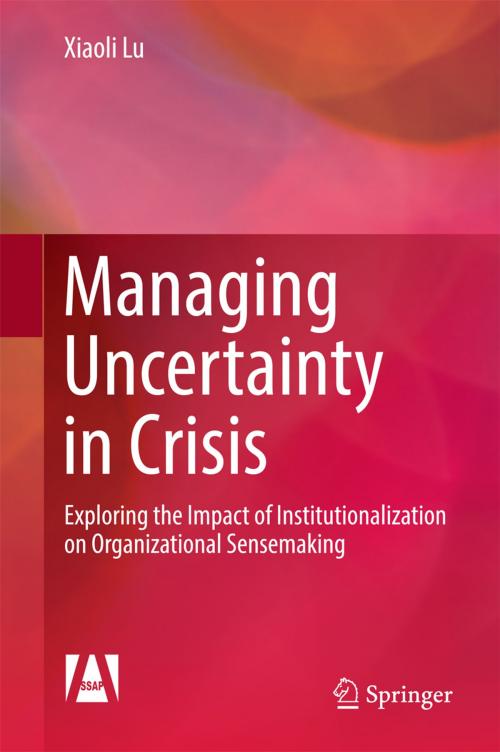Managing Uncertainty in Crisis
Exploring the Impact of Institutionalization on Organizational Sensemaking
Nonfiction, Social & Cultural Studies, Political Science, Government, Public Policy, Social Science, Sociology| Author: | Xiaoli Lu | ISBN: | 9789811039904 |
| Publisher: | Springer Singapore | Publication: | November 7, 2017 |
| Imprint: | Springer | Language: | English |
| Author: | Xiaoli Lu |
| ISBN: | 9789811039904 |
| Publisher: | Springer Singapore |
| Publication: | November 7, 2017 |
| Imprint: | Springer |
| Language: | English |
This book studies the variety of organizational strategies selected to cope with critical uncertainties during crises. This research formulates and applies an institutional sense-making model to explain the selection of strategies for coping with uncertainties during crises to answer the question why some organizations select a rule-based strategy to cope with uncertainties, whereas others pursue a more ad hoc-based strategy. It finds that the level of institutionalization does not affect strategy selection in the initial phase of responding to crises; that three rigidity effects can be identified in the selection of sense-making strategies once organizations have faced the failure of their selected strategies; that discontinuities in the feedback loop of sense-making do not necessarily move organizations to switch their sense-making strategies, but interact with institutionalization to contribute to switching sense-making strategies.
This book bridges the gap between institutional thinking and crisis management theorizing. A major step forward in the world of crisis management studies!
——Professor Arjen Boin, Leiden University, the Netherlands
In a world of increasingly complex, sociotechnical systems interacting in high-risk environments, Professor Lu’s analysis of how organizations manage uncertainty is both timely and profound.
——Professor Louise K. Comfort, Director, Center for Disaster Management, University of Pittsburgh, USA
Prof. Lu greatly enhances our understanding of how organizations cope with uncertainty and make sense of their challenges under the pressures of catastrophe.
——Dr. Arnold M. Howitt, Faculty Co-Director, Program on Crisis Leadership, Harvard Kennedy School, USA
This book provides not only a theory of crisis management but also a key concept around which research and practice can be conducted.
——Professor Naim Kapucu, Director of School of Public Administration, University of Central Florida, USA
A generic institutional model for analyzing and managing hazards, disasters and crises worldwide.
——Professor Joop Koppenjan, Erasmus University Rotterdam, the Netherlands
This book has done an excellent job in opening the black box of how organizations make sense of the crisis situations they face and develop strategies to respond. It should be read by all of us who wish for a peaceful and safe world.
——Professor Lan Xue, Dean of School of Public Policy and Management, Tsinghua University, China
This book studies the variety of organizational strategies selected to cope with critical uncertainties during crises. This research formulates and applies an institutional sense-making model to explain the selection of strategies for coping with uncertainties during crises to answer the question why some organizations select a rule-based strategy to cope with uncertainties, whereas others pursue a more ad hoc-based strategy. It finds that the level of institutionalization does not affect strategy selection in the initial phase of responding to crises; that three rigidity effects can be identified in the selection of sense-making strategies once organizations have faced the failure of their selected strategies; that discontinuities in the feedback loop of sense-making do not necessarily move organizations to switch their sense-making strategies, but interact with institutionalization to contribute to switching sense-making strategies.
This book bridges the gap between institutional thinking and crisis management theorizing. A major step forward in the world of crisis management studies!
——Professor Arjen Boin, Leiden University, the Netherlands
In a world of increasingly complex, sociotechnical systems interacting in high-risk environments, Professor Lu’s analysis of how organizations manage uncertainty is both timely and profound.
——Professor Louise K. Comfort, Director, Center for Disaster Management, University of Pittsburgh, USA
Prof. Lu greatly enhances our understanding of how organizations cope with uncertainty and make sense of their challenges under the pressures of catastrophe.
——Dr. Arnold M. Howitt, Faculty Co-Director, Program on Crisis Leadership, Harvard Kennedy School, USA
This book provides not only a theory of crisis management but also a key concept around which research and practice can be conducted.
——Professor Naim Kapucu, Director of School of Public Administration, University of Central Florida, USA
A generic institutional model for analyzing and managing hazards, disasters and crises worldwide.
——Professor Joop Koppenjan, Erasmus University Rotterdam, the Netherlands
This book has done an excellent job in opening the black box of how organizations make sense of the crisis situations they face and develop strategies to respond. It should be read by all of us who wish for a peaceful and safe world.
——Professor Lan Xue, Dean of School of Public Policy and Management, Tsinghua University, China















